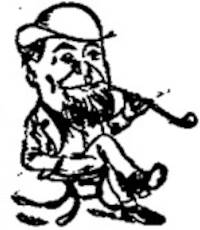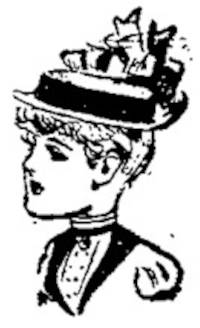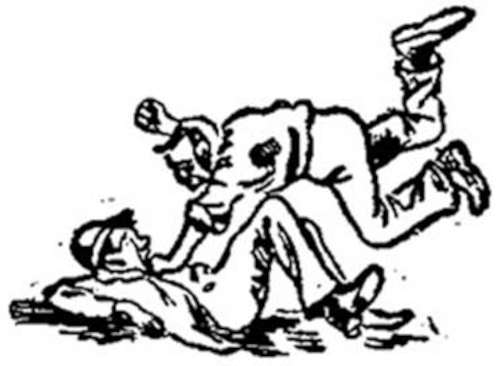This article has been transcribed from a copy of the Cardiff Times in the online collection of scanned Welsh newspapers 1804-1919 in the National Library of Wales, with grateful recognition of the free access accorded to all readers. Paragraph breaks have been introduced for easier reading.
The ubiquity of football as a topic among men in public houses is baffling to Samuel. Football Association rules date back to 1863, and the FA Cup to 1871. If Samuel’s attitude to footballisters smacks of snobbery, it is worth remembering that Association Football was not a working-class game in it early days. Oxford University won the FA Cup in 1874, while Old Etonians won in it 1879. In the 1870s football was considered a recreation for gentlemen, but by 1887 we see it transitioning into a national sport. The lucky winner of the bet has won two thirds of an Imperial quart of beer (approximately three-quarters of a litre), a ‘blue’ being, the Oxford English Dictionary tells us, a term in South Wales for a third of a pint. Although the Cardiff football team would later be called ‘The Blues’, there is no word-play here, since the Cardiff City club would not be founded until 1899 (as Riverside A.F.C.). Samuel finds it incongruous and perhaps demeaning that women attend men’s sporting fixtures. He has almost certainly learned Latin at school, and is possibly recalling a line from Ovid’s De arte amandi which was set to be learned off by heart and was frequently quoted: 'Spectatum veniunt; veniunt specentur ut ipsae'. ('The ladies come to see and to be seen'.) Compare his article, ‘Samuel at a Female Football Match’ of 2nd April 1887. —— David Skilton

‘I knew Cardiff would win.’
I must say, sir, at the very outset of this article, that although I in a certain sense admire the game of football that is as a spectator – I am by no means, when the winter sets in, prepared to surrender myself body and soul, so to speak, to that game and its votaries, as do some of my friends and acquaintances. I can, in fact, well conceive that there are other subjects of conversation open to a man between Friday and the following Wednesday than some given local match of importance. Candidly speaking, I had rather speak about a number of interesting subjects especially about myself – but go where I will, and do what I will, I am haunted and tortured by that eternal, unspeakable football. Whene'er l take my walks abroad and meet a friend, almost the first thing he says to me, after asking after my health in a cursory way which leads me to think that he doesn't care a straw about the subject, is ‘Are you going to the match?’ ‘What match?’ say I, innocently. He stares aghast at me, and seems to be divided in opinion as to whether I am, in vulgar phrase, ‘going off my chump,’ or having a joke at his expense – which is about the only thing I ever do get at his expense, probably. ‘What match?’ I repeat. ‘Why,’ says he, ‘the Cardiff versus Newport to be sure; where have you been living – in Cardiff gaol?’ and away he hurries.

‘An Artisan Critic.’
If it be Saturday and I call to have a bit of luncheon at a restaurant, I find the whole male company present eating like wild beasts and bolting their food in a manner which presages well for the advertising indigestion specific people and the doctors, for all these hungry men want to be at some match, where they will probably stand in a keen east wind, or a regular downpour like that of last Saturday, and enjoy themselves thoroughly according to their own estimate. But these same men, it is highly probable, will be heated enough before the night is over, for no set of men talk their own and other people's battles over to such an extent as do football men. Truth to speak, sir, I am myself incapable of arguing about the game in a legitimate way, for I don't know the rules fully. In this particular I am not far behind a good many of the enthusiasts, who are most loud in their assertions and contradictions when the game is referred to. There is a friend of mine, Mr Byron Barger, for instance. Barger is an impressive looking man – a preternaturally wise looking man, who wears glasses that seem to cover all his face nearly. He talks of nothing but football, sir, and gives you to understand that when he was ‘a few years younger’ he did big things in the game, though I have never yet met any devotee thereof who ever saw Barger play. He is great on ‘form’ and nice points, and all that sort of thing, and he uses the names of all the prominent footballists with extreme glibness, at the same time giving you to understand that the whole of them are guided in all their actions solely by his advice. He is generally particularly ‘down’ upon umpires and referees when there is a dispute, and at the bar of the Angel Hotel, which he frequents, he says pompously, and with an air of great conviction, ‘Yes, sir, the referee was distinctly wrong, and that's what I said to Morgan, of the committee. And Morgan owned that I was right; be recognised my knowledge of the game. Why, what did I say to Potter in a precisely similar case some years ago? Well, I laid down the law, and I said, “Potter,” said I, “you stick to the game, and you'll make your mark.” Bless you, he'd never have played but for me. He plays just as I did when I used to go in for the game.’ Before Barger's time for going home arrives, he will be at loggerheads with half the people in the room – and all about football. For myself, I can't escape from the thraldom of that blessed game. Only the other evening, I was near your office, attentively studying an evening, paper, when a man who looked like an animated rag shop addressed me thusly, ‘Axin your pardin', guv'nor, but will yer let's look at your paper a minnit?’ In a dazed sort of way I handed him the sheet, imagining that he probably wanted to look for a situation as an effective scarecrow. Eagerly did he run his gin-bedimmed eye over the football results, and then he said with a chuckle, which sounded something like a showman's rattle, ‘I have won two blues;[i] thanking yer, guv'nor.’ And away he shuffled. Only the same night, sir, I attempted to interview a British working man in order to obtain his views on a certain phase of the labour question. I found that, as regards the latter, he ‘had never thought much about it,’ and didn't mean to so long as he got his ‘wage.’ He, however, invited my opinion. as to the prospects of Newport on Saturday.

‘An Attractive Spectator.’
Even when I am walking alone in the street, football pursues – literally pursues me, for dirty boys block the minor thoroughfares by kicking about in an indiscriminate sort of way balls compounded of dirty rags, which, when they get wet and happen to come in contact with your cheek, which they by no means seldom do, make you look like the ‘Piebald Wonder’ in a show at a feast. Every hoarding on every wall, too, reminds one of the matches to come – of the matches to be fought over again by one's friends, with fearful iteration in the trams, at home, in the clubs everywhere. It is the same with one's favourite newspaper. Not only does it record the mere doings of the knights of the jersey, but it devotes long and weary lengths of columns to analysing their play, and to demonstrating why they did this or that, or why they omitted to do that or the other. 'Pon my word, sir, I begin to believe that a young man cannot, in this part of the country, do anything clever which will entitle him to prominent public notice save playing at football. The footballists are the heroes of the hour. If you stand in the street conversing with a football enthusiast, he will say in a mysterious sort of way, as a very ordinary-looking young man goes past. ‘Do you know who that is?’ You mildly express your ignorance of the young person's identity. ‘Why,’ he will say, doubtless imagining that you will be somewhat overwhelmed at the intelligence, and will remember the day all your life, ‘that is Jones, the celebrated half back.’ If you merely observe, ‘Oh, is it? well, what of that?’ as I do, the football enthusiast will go away disgusted, having first remarked, in my own case, that those ‘writing fellows never think that anyone is clever but themselves.’ I have heard some enthusiasts say that not only is the fact of a young man being an accomplished three-quarter or half, or what you like, a certain passport to the consideration of a great majority of the beings of the stronger sex, but that it is also a powerful lever in moving the affections of the weaker vessels. This is greatly to be doubted, sir. Were I asked to give a reason for the attendance of so many ladies at football matches, I should say that they either went because they get an opportunity in the winter months – when there are but few opportunities for an effective outside show – of displaying themselves, or that they were girls who had been jilted, and who gratified the lingering spleen within them by seeing men knock about their fellow-men as much as possible.

‘Discussing the game.’

‘A Non-Enthusiast.’
I must, of course, number a large contingent of medical men amongst football enth[u]siasts, but the interest they take in the game is open to a natural sort of suspicion. I quite admit that many young practitioners are constant attendants at important matches – no doubt they are; they are waiting for a job. Or perhaps many of them who are interested in scientific research attend matches as they would operations in a dissecting room. Besides, it must be eminently instructive to a doctor to go to a match and see how much battering about a man can receive without expiring on the spot. If you want to see the football enthusiast of the more vulgar order in all his glory, Saturday night is the time. So hot do some of the Saturday night wrangles wax that scrimmages in the gutter are not by any means uncommon, whilst the crowd lines up (I think that is the term) near the kerbstone. It must not be imagined from all this that I am disparaging the game of football. I have as great an appreciation as anybody for those manly British sports which make the thews and sinews of our young fellows what they are – which make them, our young fellows, hardy and self-reliant, and ready for any foeman when the hour of need comes. I like football, but I take care not to play it. All that I complain of in regard to it is in relation to the species of madness it engenders in a numerous body of otherwise rational beings, who refuse to discuss any other subject whatever. But there, sir, I know that I am in a most painful minority on this question. If I want to avoid the subject I shall have to shut myself up in the house all the winter, or I shall, if I must talk about other subjects with anyone, hire a man to call every day and converse with me, at the same time commanding him to avoid football comments under a heavy penalty. Perhaps there is amongst your readers some being of a like way of thinking. If there be, let him by all means communicate with me, for I shall greedily take him to my bosom.
Links to Related Material
- The Development of Leisure in Britain after 1850
- The Development of Sports in Victorian England — Participation and Spectatorship
- Samuel at a Female Football Match
- Samuel on Football
Last modified 22 January 2022